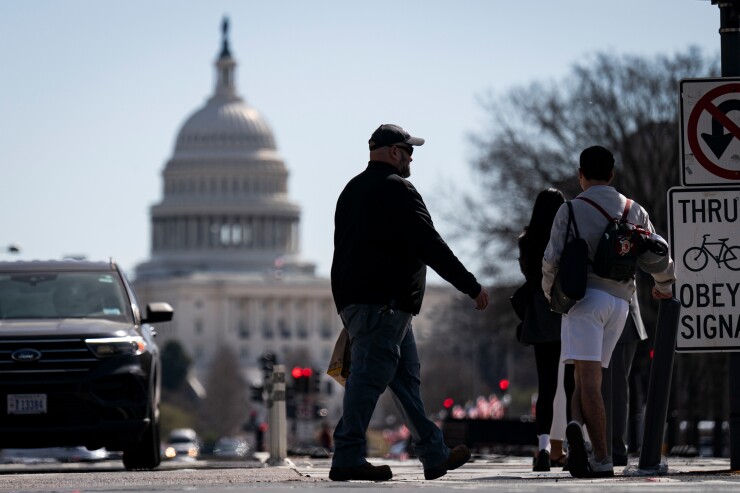The far-reaching tax reconciliation bill advanced this week by the House Ways and Means Committee is full of provisions that would not only extend the expiring provisions of the Tax Cuts and Jobs Act of 2017, but add significant new provisions to the Tax Code.
The "
"There's a lot of business-related provisions," said Rochelle Hodes, a principal in the Washington national tax office at Crowe, a Top 25 Firm based in Chicago. "I think businesses have a lot to chew on."
Some businesses may find benefits and disadvantages in the legislation. "In the amortization and depreciation category, it offers a lot on immediate expensing of a whole variety of things," said Hodes. "There is a focus on U.S. businesses taking advantage of these benefits. There are a number of provisions that limit benefits to foreign-owned businesses. A number of the provisions for foreign research have a bias to activities in the U.S."
Similarly, many of the tax benefits are limited for immigrants. "In the individual provisions, we've got a lot of provisions that include eligibility requirements for having a Social Security number, tightening those rules," said Hodes. "For instance, on the Child Tax Credit, not only does the child need an SSN, but so does whoever is claiming the credit, and if married, both claimants. Those are consistent with the policies that this administration has put forward."
Discussion is continuing among Republicans on how much to raise the
"There is not a consensus among the Republican caucus regarding how the expiring SALT cap should be resolved," said Hodes. "That's how I would put it."
House Speaker Mike Johnson, R-Louisiana, has been trying to resolve such differences. "I think the speaker has done a wonderful job of shepherding the reconciliation process in the House," said Hodes. "Even though, from the outside, it looks like there are a number of things that could undermine getting a bill passed through the House, I think Speaker Johnson seems to be demonstrating an ability to have his caucus meet the goals that have been set forth for them."
"A lot of businesses have been benefiting, and those businesses are clustered in particular places that have Republican representation," said Hodes.
Crowe has published an
"The energy tax benefits are still alive for a little bit, just for less time," said Hodes. "Some of the benefits are going to go away much sooner, but for some of them, they only shaved a couple of years off."
MAGA accounts
The legislation also contains some surprises such as so-called "MAGA accounts" for children under eight years old. The Money Accounts for Growth and Advancement are described as a new kind of savings account designed to incentivize education, entrepreneurship and homeownership while promoting financial security, according to a
Starting Jan. 1, 2026, parents of any child under the age of eight would be able to open a MAGA account for their child. The accounts, allowable for children born after Jan. 1, 2024, are eligible to receive contributions from parents, relatives, and other taxable entities as well as nonprofit and government entities facilitated by the Treasury Department.
To be eligible to open an account, the child would need to be a U.S. citizen and at least one parent would need to provide their Social Security number. The Social Security number provided would need to be considered "work-eligible" in order to open an account. MAGA account funds must be invested in a diversified fund that tracks an established index of U.S. equities. Parents would be able to contribute up to $5,000 annually of after-tax dollars to a MAGA account. The $5,000 contribution limit is indexed for inflation.
For U.S. citizens born between Jan. 1, 2024, and Dec. 31, 2028, the federal government would contribute $1,000 per child into every eligible account. For newborns, MAGA accounts may be opened by parents or guardians.
Direct File and Free File elimination
As expected, the bill would eliminate the Internal Revenue Service's new Direct File program for free tax filing, but unexpectedly it would also get rid of the longstanding Free File program in favor of another unspecified public-private partnership that sounds reminiscent of Free File.
"This provision terminates the current Direct File program at the IRS and establishes a public-private partnership between the IRS and private sector tax preparation services to offer free tax filing, replacing both the existing Direct File and Free File programs," according to a
International and nonprofit taxes
The bill includes a number of international tax provisions from the TCJA such as Global Intangible Low-Taxed Income, Foreign-Derived Intangible Income and Base Erosion and Anti-Abuse Tax.
"The change that would eliminate the increase in the GILTI, FDII and BEAT rates that are scheduled to go in this year, and Section 899 for what's called 'unfair foreign taxes,'" said Hodes. "That has caught the attention of our international folks. That provision would allow increased rates for a number of tax provisions in the code that impact inbound folks."
Not-for-profit organizations are also concerned about an increase in net investment income taxes for private colleges and universities in the bill. "You've got increased rates of tax for private foundations," said Hodes. "You've got changes in the excess comp rules that's going to make those rules more expansive, You've got an expansion of the unrelated business taxable income rules that applies to the NIL [name, image and likeness rights of college athletes] in certain circumstances. There's a whole host of things that our firm is looking at."
